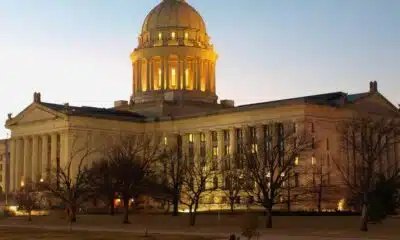News from the South - Tennessee News Feed
Memorial Day in Nashville
by Lookout Staff, Tennessee Lookout
May 26, 2025
Members of Scouting USA, formerly Boy Scouts of America, traditionally place flags on graves in veterans cemeteries across the U.S. Tennessee Lookout photojournalist John Partipilo went to Nashville National Cemetery in Madison to document a local scout pack doing the 2025 honors.
Land for the cemetery was purchased in 1866. In 1867, it opened and the first interments were of Civil War dead, transplanted from veterans hospital cemeteries in the region. There are more than 4,000 unknown dead interred in the cemetery, which is administered by the U.S.Department of Veterans Affairs.
{ “@context”: “http://schema.org”, “@type” : “ImageGallery”, “id” : “https://tennesseelookout.com/2025/05/26/memorial-day-in-nashville/”, “url” : “https://tennesseelookout.com/2025/05/26/memorial-day-in-nashville/” }
Tennessee Lookout is part of States Newsroom, a nonprofit news network supported by grants and a coalition of donors as a 501c(3) public charity. Tennessee Lookout maintains editorial independence. Contact Editor Holly McCall for questions: info@tennesseelookout.com.
The post Memorial Day in Nashville appeared first on tennesseelookout.com
Note: The following A.I. based commentary is not part of the original article, reproduced above, but is offered in the hopes that it will promote greater media literacy and critical thinking, by making any potential bias more visible to the reader –Staff Editor.
Political Bias Rating: Centrist
This content presents a straightforward, factual account of Memorial Day activities at the Nashville National Cemetery, focusing on Scouts honoring veterans by placing flags on graves. It avoids ideological language or partisan framing and instead highlights community service and historical context. The tone is respectful and neutral, emphasizing shared values around honoring military service without promoting any political perspective, making it balanced and suitable for a broad audience.
News from the South - Tennessee News Feed
What Black City Gets the National Guard – The Tennessee Tribune
SUMMARY: Over the weekend, protests erupted in cities like Washington, D.C., and Chicago against President Trump’s threat to deploy National Guard troops, which Illinois Governor JB Pritzker condemned as a “fake guise of fighting crime.” Trump’s selective targeting of cities with Black mayors in Democratic states, including New Orleans, has raised concerns of racial bullying. Los Angeles was the first city to face military deployment during an immigration crisis, a move later ruled illegal for violating the Posse Comitatus Act. Baltimore’s former mayor also denied any crime emergency, criticizing the stigma caused by potential National Guard involvement.
The post What Black City Gets the National Guard – The Tennessee Tribune appeared first on tntribune.com
News from the South - Tennessee News Feed
DATA: ICE detainer requests in Tennessee up by 86.5% compared to last year
SUMMARY: ICE detainer requests in Tennessee surged 86.5% this year, with a 31.8% rise in Davidson County, according to new data. Representative Lee Reeves highlighted strains on local resources from illegal immigration, citing law violations in small towns like Robertson County. Reeves urges more local agencies to adopt 287(g) agreements, which grant federal immigration enforcement powers to sheriffs, including jail enforcement, task force, and warrant officer models. Currently, 27 Tennessee sheriffs participate in these agreements, contributing to the state’s ranking as second nationwide for ICE arrests in jails. Reeves credits tougher immigration enforcement under President Trump and supports legislation to mandate 287(g) adoption statewide. Detainer requests in Shelby County rose only slightly.
The post DATA: ICE detainer requests in Tennessee up by 86.5% compared to last year appeared first on www.wkrn.com
News from the South - Tennessee News Feed
Spring Hill father recovers after saving family from fire
SUMMARY: A Spring Hill father heroically saved his 7-year-old son Silas from a raging house fire that engulfed their home. Ashley, the mother, described frantic moments as she tried to escape with their 3-year-old daughter Milly and called for Silas amidst the smoke. Brandon, the father, made multiple attempts to rescue Silas, risking his life. Both children suffered burns but have been cleared from the hospital. Brandon is recovering from burns and exhaustion at Vanderbilt University Medical Center. The family lost everything in the fire. First responders and police aided the family and praised Brandon’s bravery. The family continues to heal and hopes for recovery.
A Spring Hill father continues to recover after saving his son from a house fire.
-
News from the South - Texas News Feed6 days ago
Texas high school football scores for Thursday, Sept. 4
-
News from the South - Louisiana News Feed5 days ago
Portion of Gentilly Ridge Apartments residents return home, others remain displaced
-
News from the South - North Carolina News Feed6 days ago
Hanig will vie for 1st Congressional District seat of Davis | North Carolina
-
News from the South - Oklahoma News Feed7 days ago
Oklahoma Unprepared for Looming Guardianship Crisis
-
News from the South - Alabama News Feed6 days ago
Alabama state employee insurance board to seek more funding, benefit changes
-
Our Mississippi Home6 days ago
The Hummingbirds’ Last Hooray of Summer
-
The Conversation7 days ago
Scientific objectivity is a myth – cultural values and beliefs always influence science and the people who do it
-
News from the South - West Virginia News Feed5 days ago
WV Supreme Court will hear BOE’s appeal in vaccine lawsuit — but not right away












































